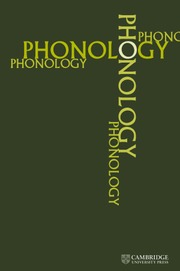Article contents
On the phoneme as the unit of the ‘second articulation’
Published online by Cambridge University Press: 20 October 2008
Abstract
This paper reviews the recent experimental evidence bearing on the issue of the psychological reality of the phoneme, particularly its general CLASS character, the relative NON-DISCRIMINABILITY of its positional variants (allophones), and its status as a discrete SEGMENT. Evidence bearing on a few selected problems of English phonemics is also discussed. All of the experiments cited, however, seem to have been to some extent contaminated by orthographic effects; moreover, a host of other studies go so far as to suggest that knowledge of spelling may not only impinge critically on phonological judgements, but that the very ability to segment speech may be a by-product of learning an alphabetic orthography. But as the experiments to date have been largely restricted to overt judgements about a rather limited range of words, the possibility still remains open that a phonemic segmentation of speech may well occur at an unconscious, perceptual level even in the pre-literate period.
- Type
- Research Article
- Information
- Copyright
- Copyright © Cambridge University Press 1986
References
- 4
- Cited by


